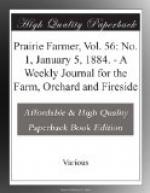A pound of the material, which is light, will be enough for a wheelbarrow of potting soil. After all, the question is not so much the exact material employed of a number of similar agents, as it is with the intelligence brought to bear so as to apply at the right time the right quantity, and under the best possible circumstances.
EDGAR SANDERS.
SCIENTIFIC.
AM I A SCOT, OR AM I NOT?
If I should bring a wagon o’er
From Scotland to Columbia’s shore,
And by successive wear and tear
The wagon soon should need repair:
Thus, when the tires are worn through,
Columbia’s iron doth renew;
Likewise the fellies, hubs, and spokes
Should be replaced by Western oaks;
In course of time down goes the bed,
But here’s one like it in its stead.
So bit by bit, in seven years,
All things are changed in bed and gears,
And still it seems as though it ought
To be the one from Scotland brought;
But when I think the matter o’er,
It ne’er was on a foreign shore,
And all that came across the sea
Is only its identity.
I came, a Scotchman, understand,
By choice, to live in this free land,
Wherein I’ve dwelt, from day to
day,
’Till sixteen years have passed
away.
If physiology be true,
My body has been changing too;
And though at first it did seem strange,
Yet science doth confirm the change;
And since I have the truth been taught,
I wonder If I’m now a Scot?
Since all that came across the sea
Is only my identity.
—Wm. Taylor, in Scientific American.
PRIMITIVE NORTHWEST.
Mr. C.W. Butterfield contributes an article on the Primitive Northwest, to last number of the American Antiquarian. He says that early in the seventeenth century French settlements, few in number, were scattered along the wooded shores of the river St. Lawrence in Canada. To the westward, upon the Ottowa river, and the Georgian bay, were the homes of Indian nations with whom these settlers had commercial relations, and among some of whom were located Jesuit missionaries. In the year 1615, Lake Huron was discovered.




